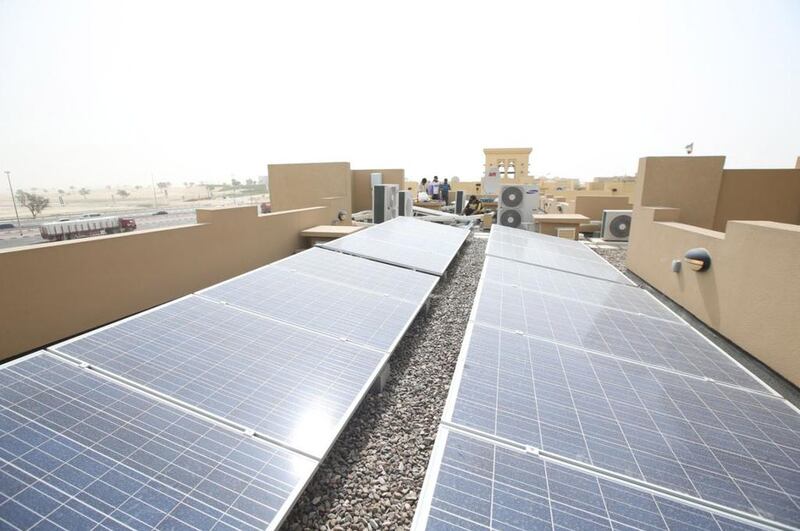Dubai’s renewable energy programme is gathering pace.
Dubai Electricity and Water Authority said that solar photovoltaic (PV) panels have been installed on 30 buildings as part of the Shams Dubai initiative launched last year.
Dewa said that of these, six have been connected to the grid, as part of Dubai’s plans to become one of the world’s smartest cities and diversify its energy mix.
The utility said that it was working with 18 government organisations to connect 37 projects, with a total capacity of 279 kilowatts. However, it did not provide a time frame.
The move is yet to be implemented in the residential space.
Saeed Al Tayer, the Dewa managing director and chief executive, said government and private organisations have installed PV panels as part of Shams Dubai. The three-step initiative, launched last year, includes equipping commercial and residential buildings with solar panels.
“I urge all members of society to be our partners in producing renewable energy, and achieving Dubai government’s objectives to diversify the energy mix,” he said.
Meanwhile, Dubai-based Siraj Power, which had initially set out to finance 50 megawatts of solar rooftop projects over the next five years in the emirate as part of the Shams initiative, has raised its target, noting that there is adequate demand.
Siraj is a joint venture between Akuo Energy of France and Corys Environment of Dubai.
“There is enough for 50MW for us and 50MW for five other players,” said Mohammed Abdulghaffar Hussain, the chairman of Corys. He added that the firm could have 50MW financed in half the original time.
A recent deal for 400 kilowatts involving the UAE mobile retailer Axiom Telecom has taken Siraj’s total solar rooftop capacity under construction to 1.3MW. This is a 20-year lease agreement for the country’s first privately-owned PV system.
Mr Hussain said all of these projects are financed purely through equity until Siraj has enough volume reaching “critical mass”.
Siraj is in discussions with various financial institutions, but they require a scale of projects.
“It doesn’t make sense for them to go after 1MW here and 2MW there. We agreed we’ll amass that scale and then go to a financial institution with a financing deal,” said Mr Hussain.
And he expects that to happen next year as interest continues to rise from Dubai players.
But the bottom line for any company is always profitability. Siraj expects project returns to fall between 7 and 15 per cent over 20 years. However, the smaller the system the less feasible it is to grab a better return rate.
“There is a large part of capital outlay includes some level of fixed cost that has nothing to do with size [like transformers] – feasibility increases as size increases so you won’t find a lot of 400kW projects,” he said, adding that the Axiom deal was the exception rather than the rule.
Mr Hussain said that at the pace the firm is moving, backing by a financier will possibly happen at this time next year.
But why would any company consider a solar financing scheme?
“The reason is obvious, because people are looking to save money and on the other side, investors such as ourselves are looking to generate decent returns. Prices of solar solutions have become as such that it’s possible,” he said.
lgraves@thenational.ae
Follow The National's Business section on Twitter





